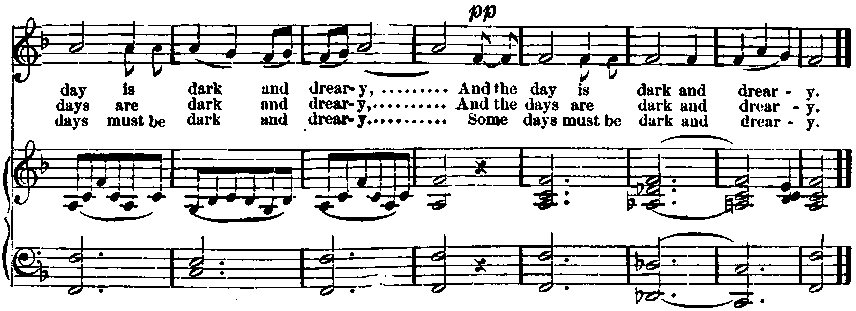Familiar Songs - Their Authors & Histories
300 traditional songs, inc sheet music with full piano accompaniment & lyrics.
| Share page | Visit Us On FB |
|
622 |
OUR FAMILIAR SONGS. |
|||
 |
||||
|
The day is cold, and dark, and dreary; It rains, and the wind is never weary; The vine still clings to the mouldering wall, But at every gust the dead leaves fall, And the day is dark and dreary.
My life is cold, and dark, and dreary: It rains, and the wind is never weary. |
My thoughts still cling to the mouldering past, But the hopes of youth fall thick in the blast, And the days are dark and dreary.
Be still, sad heart! and cease repining; Behind the clouds is the sun still shining; Thy fate is the common fate of all, Into each life some rain must fall, Some days must be dark and dreary. |
|||
|
MY MOTHER'S BIBLE.
The words of "My Mother's Bible," were written by George P. Morris. An English writer says of him: "You can hardly know the place General Morris has made himself among all classes here. His many songs and ballads are household words in every home in England. After all, what are all the throat-warblings in this world to one such heart-song as 'My Mother's Bible ! "'
N. P. Willis, General Morris's life-long friend, wrote of him: " My dear sir: To ask me for my idea of Mr. Morris, is like asking the left hand's opinion of the dexterity of the right. I have lived so long with the 'Brigadier'—known him so intimately—worked so constantly at the same rope, and thought so little of ever separating from him (except by precedence of ferriage over the Styx), that it is hard to shove him from me to the perspective distance—hard to shut my own partial eyes and look at him through other people's. I will try, however, and as it is done with but one foot off the treadmill of my ceaseless vocation, you will excuse both abruptness and brevity.
"Morris is the best known poet of the country,—by acclamation, not by criticism. He is just what poets would be if they sang like birds, without criticism; and it is a peculiarity of his fame that it seems as regardless of criticism as a bird in the air. Nothing can stop a song of his. It is very easy to say that they are very easy to do. They have a momentum somehow, that is difficult for others to give, and that speeds them to the far goal of popularity—the best proof consisting in the fact that he cau at any moment get fifty dollars for a song unread, when the whole remainder of the American Parnassus could not sell one to the same buyer for a shilling. It may or may not be one secret of his popularity, but it is a truth that Morris's heart is at the level of most other people's and his poetry flows out by that door. He stands breast-high in the common stream of sympathy, and the fine oil of his poetic feelings goes from him upon an element it is its nature to float upon, and which carries it safe to other bosoms with little need of high-flying or deep diving. His sentiments are simple, honest, truthful, and familiar; his language is pure and eminently |
||||